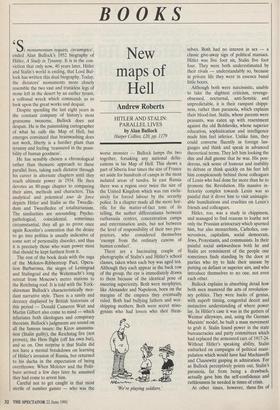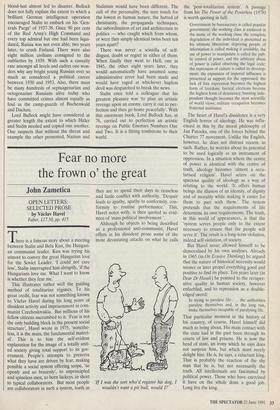BOOKS
New maps of Hell
Andrew Roberts
HITLER AND STALIN: PARALLEL LIVES by Man Bullock Harper Collins, £20, pp. 1179 Si monumentum requiris, circumspice', ended Alan Bullock's 1952 biography of Hitler, A Study in Tyranny. It is in the con- viction that only now, 40 years later, Hitler and Stalin's world is ending, that Lord Bul- lock has written this dual biography. Today, the dictators' monuments more closely resemble the two vast and trunkless legs of stone left in the desert by an earlier tyrant, a collossal wreck which commands us to look upon the great works and despair.
Despite spending the last eight years in the constant company of history's most gruesome twosome, Bullock does not despair. He is the painstaking cartographer of what he calls the Map of Hell, but emerges convinced that brainwashing does not work, liberty is a hardier plant than tyranny and feeling 'reassured in the possi- bility of human goodness'.
He has sensibly chosen a chronological rather than thematic approach to these parallel lives, taking each dictator through his career in alternate chapters until they reach ultimate power in 1934. He then devotes an 80-page chapter to comparing their aims, methods and characters. This analytical and polemical tour de force depicts Hitler and Stalin as the Tweedle- dum and Tweedledee of totalitarianism. The similarities are astounding. Psycho- pathological, coincidental, sometimes circumstantial, they all go to prove once again Koestler's contention that the desire to go into politics is usually indicative of some sort of personality disorder, and thus it is precisely those who want power most that should be kept furthest from it.
The rest of the book deals with the saga of the Molotov-Ribbentrop Pact, Opera- tion Barbarossa, the sieges of Leningrad and Stalingrad and the Wehrmacht's long retreat from Moscow's metro stations to the Reichstag roof. It is told with the York- shireman Bullock's characteristically mor- dant narrative style. There is a sanity and decency displayed by British historians of this period — Donald Cameron Watt and Martin Gilbert also come to mind — which infuriates both ideologues and conspiracy theorists. Bullock's judgments are sound on all the famous issues: the Kirov assassina- tion (Stalin guilty), the Reichstag fire (not proven), the Hess flight (off his own bat), and so on. One surprise is that Stalin did not have a mental breakdown on learning of Hitler's invasion of Russia, but returned to his dacha in the expectation of being overthrown. When Molotov and the Polit- buro arrived a few days later he assumed they had come to arrest him.
Careful not to get caught in that most sterile of number games — who was the worse monster — Bullock lumps the two together, forsaking any national delin- eations in his Map of Hell. This shows a part of Siberia four times the size of France set aside for hundreds of camps in the most isolated areas of tundra. In east Russia there was a region over twice the size of the United Kingdom which was run exclu- sively for forced labour by the security police. In a chapter made all the more hor- rific for the matter-of-fact tone of its telling, the author differentiates between euthanasia centres, concentration camps and extermination units, but not between the level of responsibility of their two pro- prietors, who considered themselves 'exempt from the ordinary canons of human conduct'.
There are a fascinating couple of photographs of Stalin's and Hitler's school classes, taken when each boy was aged ten. Although they each appear in the back row of the group, the eye is immediately drawn to them because of the identical pose of sneering superiority. Both were neophytes, like Alexander and Napoleon, born on the margins of the empires they eventually ruled. Both had bullying fathers and wor- shipping mothers. Both were secret miso- gynists who had lovers who shot them- 'We're playing soldiers.' selves. Both had no interest in sex — a classic give-away sign of political maniacs. Hitler was five foot six, Stalin five foot four. They were both underestimated by their rivals — understandably so, because in private life they were in essence banal little boors.
Although both were narcissistic, unable to take the slightest criticism, revenge- obsessed, nocturnal, anti-Semitic and unpredictable, it is their rampant chippi- ness, rather than paranoia, which explains their blood-lust. Stalin, whose parents were peasants, was eaten up with resentment against the old Bolsheviks, whose superior education, sophistication and intelligence made him feel inferior. Unlike him, they could converse fluently in foreign lan- guages and think and speak in advanced theoretical terms. They left him looking the dim and dull gnome that he was. His pon- derous, sick sense of humour and inability to debate or think quickly on his feet left him conspicuously behind those colleagues of Lenin who had done far more than he to promote the Revolution. His massive in- feriority complex towards Lenin was so painful that it drove him to visit unimagin- able humiliations and cruelties on Lenin's friends and colleagues.
Hitler, too, was a study in chippiness, and managed to find reasons to loathe not only the Prussian aristocracy which spurned him, but also monarchists, Catholics, con- servatives, capitalists, social democrats, Jews, Protestants, and communists. In their painful social awkwardness both he and Stalin are reminiscent of the people one sometimes finds standing by the door at parties who try to hide their unease by putting on defiant or superior airs, and who introduce themselves to no one, not even each other.
Bullock explains in absorbing detail how both men mastered the arts of revolution- ary politics. They were hacks of genius, with superb timing, congenital deceit and instinctive understanding of where power lay. In Hitler's case it was in the gutters of Weimar alleyways, and, using the German Marxists' model, he built a mass movement to grab it. Stalin found power in the state bureaucracies and party committees which had replaced the armoured cars of 1917-24. Without Hitler's speaking ability, Stalin embarked on campaigns of political mani- pulation which would have had Machiavelli and Clausewitz gasping in admiration. For as Bullock perceptively points out, Stalin's paranoia, far from being a drawback, actually gave him the self-confidence and ruthlessness he needed in times of crisis.
At other times, however, these fits of blood-lust almost led to disaster. Bullock does not fully explain the extent to which a brilliant German intelligence operation encouraged Stalin to embark on his 'Gen- erals Purge' of 1937-38. Once 90 per cent of the Red Army's High Command and every top admiral but one had been liqui- dated, Russia was not even able, two years later, to crush Finland. There were also eight million civilians consigned to the oubliettes by 1939. With such a casualty rate amongst all levels and cadres one won- ders why any bright young Russian ever so much as considered a political career between 1930 and 1953. Also, there must be many hundreds of septuagenarian and octogenarian Russians alive today who have committed crimes almost equally as foul as the camp-guards of Buchenwald and Dachau.
Lord Bullock might have considered at greater length the extent to which Hitler and Stalin needed and copied one another. One suspects that without the threat and example the other presented, Nazism and Stalinism would have been different. The cult of the personality, the sure touch for the lowest in human nature, the hatred of christianity, the propaganda techniques, the subordination of art and architecture to politics — who caught which from whom, or were they simply identical twins born ten years apart?
There was never a scintilla of self- disgust, doubt or regret in either of them. When finally they went to Hell, one in 1945, the other eight years later, they would automatically have assumed some administrative error had been made and would have raged at whichever hapless devil was despatched to break the news.
Stalin once told a colleague that his greatest pleasure was 'to plan an artistic revenge upon an enemy, carry it out to per- fection and then go home peacefully'. With this enormous book, Lord Bullock has, at 76, carried out to perfection an artistic revenge on Public Enemies Numbers One and Two. It is a fitting tombstone to their world.



























































 Previous page
Previous page